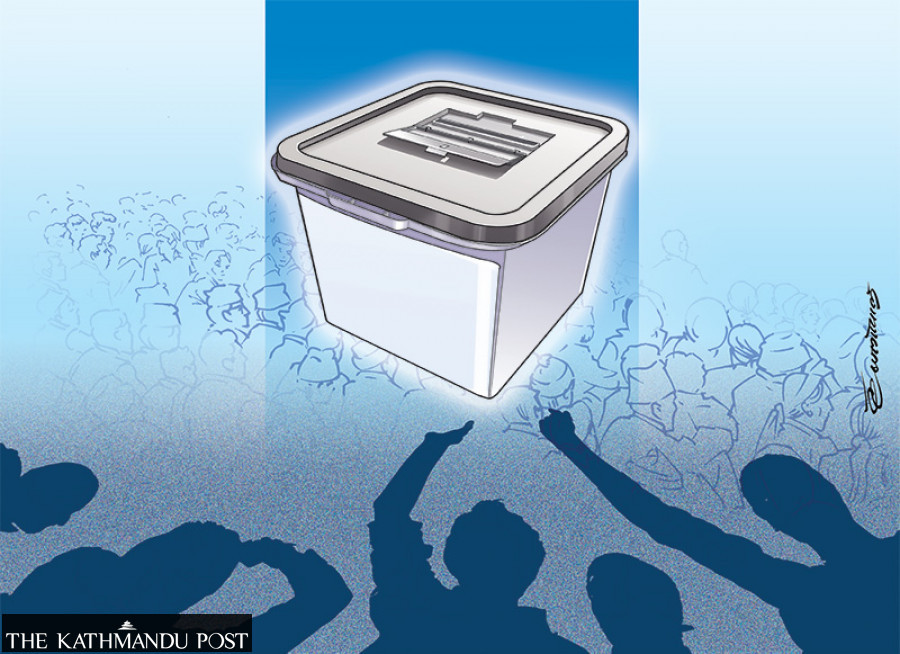National
Voters unlikely to get right to reject candidates in local level elections
Court’s eight-year-old ruling to give people right to cast negative votes yet to be implemented for the lack of a law.
Binod Ghimire
In January 2014, the Supreme Court passed a judgment, hailed as a landmark decision, giving the voters the right to cast negative votes—that is voters should have the option to reject all the candidates if they do not want to vote for anyone.
A division of then justices Kalyan Shrestha and Prakash Osti directed the government and the Election Commission to ensure a negative voting provision.
Voters should have the right to reject all the candidates if they feel the latter don’t represent them, the bench observed.
Around a year before Nepal's Supreme Court, the Indian Supreme Court had given a similar order to the Indian government to allow voters an additional option to use the none of the above (NOTA) button on the electronic voting machine. The ruling was implemented immediately in the Indian elections held in 2013.
In Nepal, the court ruling, however, was not implemented in the 2017 elections.
Five years after the first ruling, the Supreme Court in September 2019 issued another directive order to formulate a law to allow the voters to reject candidates in the elections.
“A voter must have the right to choose the option to reject all the candidates if s/he is not supporting any of them,” a division bench of justices Hari Krishna Karki and Sapana Pradhan Malla observed.
But neither the government nor the Election Commission has worked towards implementing the court rulings.
This is election year in Nepal, with local polls already announced for May 13. Due to the failure to execute the court ruling, voters will be deprived of their right to reject.
In both the rulings, the justices had argued that the voters have the right to cast votes, but they do not have the decisive power to reject candidates if they feel the candidates do not represent them. The justices said that voters should be allowed to reject all the candidates if they are not in a position to choose candidates in case there are limited choices offered by the parties.
“The provision couldn’t be implemented because political parties were not positive about it,” Dolakh Bahadur Gurung, a former election commissioner, told the Post. “We need an Act to implement the ruling, which has to be brought by Parliament.”
Following the court ruling, the Election Commission prepared a bill to clear the legal hurdles in implementing the right to reject provision. It, however, wasn’t ratified by Parliament.
In their response to the Judgment Implementation Directorate of the Supreme Court, the Election Commission and the Ministry of Home Affairs responded that the provision couldn’t be implemented as the Parliament failed to enact the law for the same.
“We had asked the commission and the ministry why the court’s ruling was not implemented,” Bed Uprety, chief of the directorate, told the Post. “They blamed the Parliament for failing to enact a law.”
A petition also had been filed at the Supreme Court charging the government and the Election Commission of contempt of court for not implementing the ruling on the right to reject.
Responding to the petition, the court sought written clarifications from the government and the Election Commission as to why the ruling wasn't implemented.
“We have already furnished our clarification to the court that we don’t have a law to implement the ruling,” Laxmi Sharma, chief of the Law Unit at the Election Commission, told the Post. “As the court had issued a directive instead of a writ, its non-implementation won’t lead to contempt.”
As the government needs to prepare an enabling environment to implement such provisions, it can take some time, according to Sharma.
He said that the commission has received the Cabinet’s approval to include NOTA in an umbrella law that it is drafting at present. However, it will not be possible to implement the provision at least in the local elections slated for May 13. The commission is drafting a bill for the umbrella Act to guide all levels of elections replacing the separate Acts that are in effect at present.
The bill will cover different provisions like allowing voting rights to the Nepalis living abroad along with the right to rejection.
It will also clarify what will happen if a majority of people vote NOTA.
In India, even if a majority choose the NOTA option, it does not impact the election results as negative votes are not counted, the candidate obtaining the highest number of votes is declared elected.
Experts on election affairs say the right to reject provision is necessary to bring systemic change in polls and make the political parties accountable while fielding the candidates. If a large number of people cast negative votes in a particular constituency, it will go as a message to political parties not to project candidates of questionable repute.
Gurung said the right to reject provision allows voters to express their reservations about candidates, if they have any.
“It is necessary to continuously put pressure on political parties to field genuine and clean candidates,” he said.
The provision of negative voting can also reduce the number of invalid votes whose rate is too high in Nepal, experts say. In the last local elections, around 17 percent of votes were invalid.
Kapil Shrestha, chairperson of the National Election Observation Committee, said people sometimes deliberately make their votes invalid in case they do not like any of the candidates fielded by political parties, as they do not have the option of right to reject.
“If the voters are given the option of right to reject, they will use that privilege instead of invalidating their votes,” Shrestha told the Post.




 10.12°C Kathmandu
10.12°C Kathmandu














